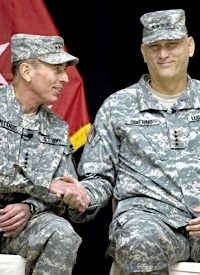
The first U.S. soldier in Iraq has been killed since the withdrawal of the last “combat” brigade from the country on August 18, according to the Manchester (UK) Guardian. The death demonstrates that Americans will continue to fight and die in Iraq even though President Obama publicly announced “combat operations” have officially ended. The soldier was reportedly killed in a mortar attack on a U.S. air base in Basra, and the Pentagon has not yet released the name of the deceased. The Pentagon estimates that 52,000 U.S. Army soldiers and Marines remain in Iraq.
But even the official claim that U.S. forces have ended “combat operations” have ended in Iraq may be reversed, if the U.S. commander in Iraq, Gen. Ray Odierno is to be believed. Odierno told CNN’s State of the Union program August 22 that it’s possible combat operations could be resumed in the country, and that U.S. forces could remain in Iraq until the year 2020. CNN’s Candy Crowley asked Odierno point blank if the “withdrawal” means the end of combat, and here was Odierno’s response:
Crowley: I want to first define our terms. Withdrawing all U.S. combat troops from Iraq, all out by September 1, doesn’t mean the end of combat involving U.S. troops in Iraq, does it?
Odierno: No. It doesn’t, Candy. What it means is our units that were organized to conduct combat operations has left.
Apparently, units not organized for combat will still be fighting combat operations in Iraq! Odierno added that “We now have units left behind that are organized to do advise-train-assist. But they certainly have the ability to protect themselves and if necessary to conduct combat operations if it was required.” Odierno explained that regular U.S. combat operations could be resumed under the following scenario: “Well if, for example, you — you had a complete failure of the security forces. If you had some political divisions within the security forces that caused them to fracture, but we don’t see that happening. They’ve been — they’ve been doing so well for so long now that we really believe we’re beyond that point.”
Odierno also laid out a scenario where the U.S. could retain “non-combat” troops in Iraq for another 10 years:
Crowley: Can you foresee a scenario like that, that there would be some U.S. military presence, albeit much smaller, at 2020?
Odierno: Well I — yes — I think I don’t know. I think it depends on what kind of presence you’re talking about.”
Odierno explained that he could see U.S. soldiers remaining in an advisory role in Iraq until 2020.
Photo: Gen. David Petraeus congratulates Lt. Gen. Ray Odierno, on his promotion to (four-star) general in Baghdad, Iraq, in 2008: AP Images


